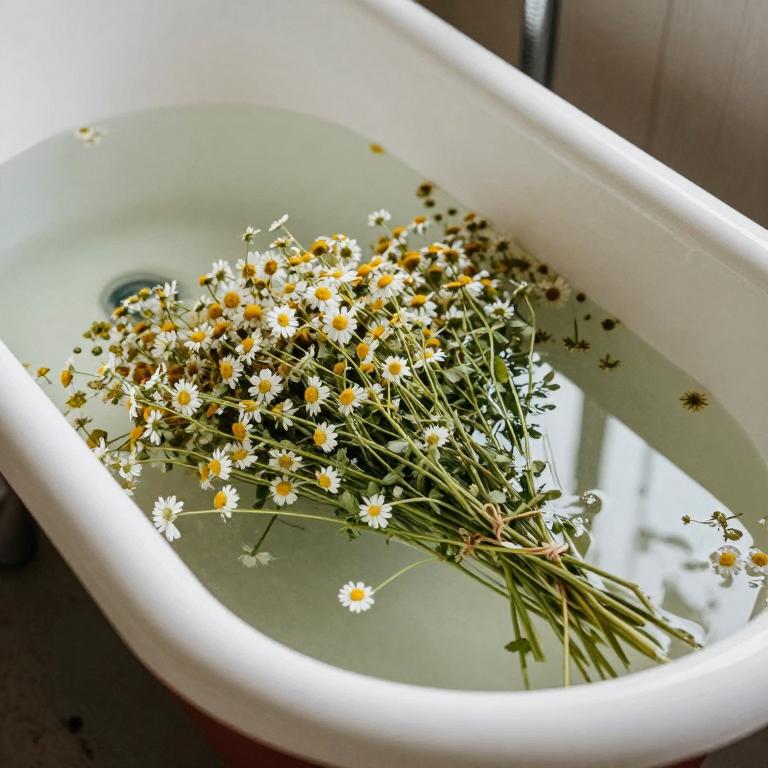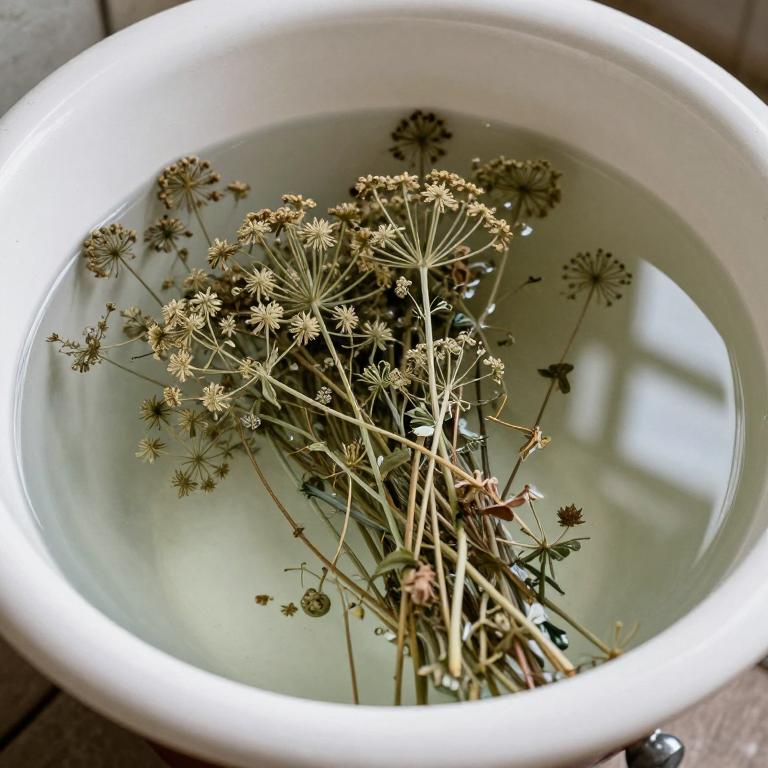10 Best Herbal Baths For Allergies

Herbal baths can be a natural and soothing remedy for individuals suffering from allergies, offering relief from symptoms such as itching, congestion, and skin irritation.
Certain herbs like echinacea, nettle, and chamomile are known for their anti-inflammatory and antihistamine properties, which may help reduce allergic reactions when used in bath water. To prepare an herbal bath, these herbs can be steeped in hot water and then added to a warm bath, allowing the skin to absorb their beneficial compounds. While herbal baths are generally safe, it is important to perform a patch test first to avoid any potential allergic reactions to the herbs.
Incorporating herbal baths into a regular self-care routine may complement traditional allergy treatments and promote overall wellness.
Table of Contents
- 1. Stinging nettle (Urtica dioica)
- 2. Yarrow (Achillea millefolium)
- 3. Salvia (Salvia officinalis)
- 4. Chamomile (Matricaria chamomilla)
- 5. Rosemary (Rosmarinus officinalis)
- 6. Field horsetail (Equisetum arvense)
- 7. English lavender (Lavandula angustifolia)
- 8. Thyme (Thymus vulgaris)
- 9. St. john's wort (Hypericum perforatum)
- 10. Anise (Pimpinella anisum)
1. Stinging nettle (Urtica dioica)

Urtica dioica, commonly known as stinging nettle, has been traditionally used in herbal baths to alleviate symptoms of allergies due to its anti-inflammatory and antihistamine properties.
When infused into warm water, a nettle bath can help reduce skin irritation and soothe allergic reactions by calming the immune system's over-response. The plant contains compounds like histamine and acetylcholine, which may counteract the body's own histamine release, thereby easing allergy symptoms. To prepare a nettle bath, fresh or dried nettle leaves are steeped in hot water and then added to a tub, allowing the skin to absorb the beneficial compounds.
While generally safe, individuals with sensitive skin should perform a patch test and consult a healthcare provider before using nettle baths for persistent or severe allergies.
2. Yarrow (Achillea millefolium)

Achillea millefolium, commonly known as yarrow, has been traditionally used in herbal baths to alleviate allergy symptoms due to its anti-inflammatory and antihistamine properties.
When infused into bath water, yarrow can help soothe irritated skin and reduce redness associated with allergic reactions. The plant contains compounds like azulene and chamazulene, which are known for their calming and therapeutic effects on the skin. Taking a yarrow herbal bath regularly may support the body’s natural healing processes and provide relief from seasonal allergies.
However, it is important to consult with a healthcare provider before using yarrow baths, especially for individuals with known allergies or sensitive skin.
3. Salvia (Salvia officinalis)

Salvia officinalis, commonly known as sage, has been traditionally used in herbal baths to alleviate symptoms of allergies due to its anti-inflammatory and antihistamine properties.
When infused into bath water, sage can help soothe irritated skin and reduce redness associated with allergic reactions. The aromatic compounds in sage also have a calming effect, which may help ease the stress often linked to allergy symptoms. To prepare a sage bath, simply steep fresh or dried sage leaves in hot water for several minutes before adding the infusion to warm bath water.
Regular use of sage baths may support overall immune health and provide a natural, soothing remedy for those suffering from seasonal or environmental allergies.
4. Chamomile (Matricaria chamomilla)

Matricaria chamomilla, commonly known as chamomile, is a popular herb used in herbal baths to alleviate symptoms of allergies due to its calming and anti-inflammatory properties.
When infused into bath water, chamomile can help soothe irritated skin and reduce redness, which is often associated with allergic reactions. The essential oils in chamomile have been shown to possess antihistamine effects, potentially helping to ease allergic responses. Regular use of chamomile baths may also promote relaxation and reduce stress, which can exacerbate allergy symptoms.
However, individuals with a known sensitivity to ragweed or other related plants should exercise caution when using chamomile, as cross-reactivity is possible.
5. Rosemary (Rosmarinus officinalis)

Rosmarinus officinalis, commonly known as rosemary, has been traditionally used in herbal baths to alleviate symptoms of allergies due to its antihistamine and anti-inflammatory properties.
When infused into bath water, rosemary essential oil or dried leaves can help soothe irritated skin and reduce redness associated with allergic reactions. The aromatic compounds in rosemary may also help calm the nervous system, providing relief from the stress often linked to chronic allergies. Regular use of rosemary herbal baths can support the body's natural detoxification processes and enhance overall respiratory health.
However, it is important to dilute rosemary oil properly and perform a patch test to avoid skin irritation, especially for those with sensitive skin.
6. Field horsetail (Equisetum arvense)

Equisetum arvense, also known as horsetail, has been traditionally used in herbal baths to alleviate symptoms of allergies due to its high concentration of silica and anti-inflammatory properties.
When infused into warm water, horsetail can help soothe irritated skin and reduce redness associated with allergic reactions. Its astringent qualities may also help to tighten pores and minimize the appearance of hives. Herbal baths with horsetail are often recommended as a complementary therapy to support overall skin health and immune function.
However, it is important to consult with a healthcare provider before using horsetail baths, especially for individuals with sensitive skin or existing allergies.
7. English lavender (Lavandula angustifolia)

Lavandula angustifolia, commonly known as English lavender, has been widely used in herbal baths for its calming and soothing properties.
When infused into bath water, lavender essential oils can help alleviate symptoms of allergies by reducing inflammation and calming the nervous system. The aromatic compounds in lavender may also help ease respiratory congestion and soothe skin irritation often associated with allergic reactions. Regular use of lavender baths can promote relaxation and support the body's natural healing processes.
However, it is important to ensure proper dilution of essential oils to avoid skin irritation and to consult with a healthcare professional for persistent or severe allergic symptoms.
8. Thyme (Thymus vulgaris)

Thymus vulgaris, also known as common thyme, has been traditionally used in herbal baths to alleviate allergy symptoms due to its antihistamine and anti-inflammatory properties.
When infused into bath water, thyme can help reduce skin irritation and soothe respiratory discomfort associated with seasonal allergies. The essential oils in thyme, particularly thymol, have been shown to support immune function and may help the body better manage allergic reactions. To use thyme vulgaris in a bath, simply steep a handful of dried thyme in hot water for several hours, then add the infusion to a warm bath.
While herbal baths can offer complementary relief, they should not replace medical treatment for severe allergies and should be used under the guidance of a healthcare professional.
9. St. john's wort (Hypericum perforatum)

Hypericum perforatum, commonly known as St. John's Wort, has been traditionally used in herbal baths to alleviate symptoms of allergies due to its anti-inflammatory and antihistamine properties.
When infused into bath water, the active compounds in hypericum, such as hypericin and hyperforin, can help reduce skin irritation and redness associated with allergic reactions. These baths may also promote relaxation and soothe the nervous system, which can be beneficial for individuals experiencing stress-related exacerbation of allergy symptoms. However, it is important to consult a healthcare professional before using St. John's Wort, as it can interact with certain medications.
Despite its potential benefits, more scientific research is needed to fully understand its efficacy and safety in treating allergies through herbal baths.
10. Anise (Pimpinella anisum)

Pimpinella anisum, commonly known as anise, has been traditionally used in herbal baths to alleviate symptoms of allergies due to its soothing and anti-inflammatory properties.
When added to warm bath water, anise essential oil or dried anise seeds can help reduce skin irritation and soothe respiratory discomfort associated with allergic reactions. The aromatic compounds in anise may also help calm the nervous system, promoting overall relaxation and easing stress-related exacerbation of allergy symptoms. However, it is important to use anise in moderation and consult a healthcare professional before incorporating it into a bath regimen, especially for those with sensitive skin or existing medical conditions.
While anecdotal evidence supports its use, more scientific research is needed to fully understand its efficacy in treating allergies through herbal baths.